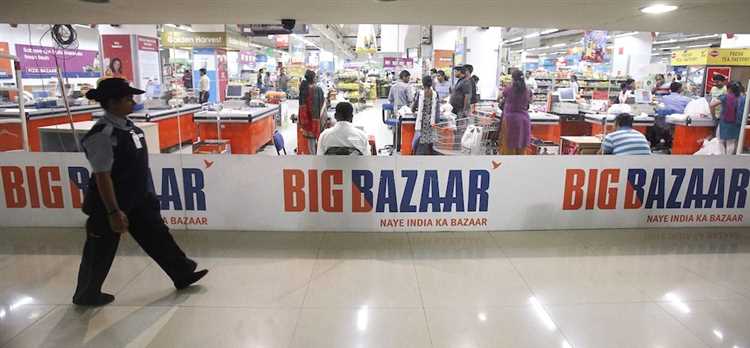
Big Bazaar, one of India’s largest retail chains, has recently been fined for their use of carry bags. The National Green Tribunal (NGT) imposed a penalty on Big Bazaar for violating environmental norms and polluting the environment with these plastic carry bags. This decision comes as part of a wider effort by the Indian government to combat the country’s plastic waste problem.
The NGT stated that Big Bazaar was not only using plastic carry bags in violation of previous orders, but also failing to comply with waste management regulations. The tribunal ordered the retail chain to pay a hefty fine and demanded that they take immediate action to address these issues. This landmark decision serves as a reminder to other retailers that they too will face consequences if they continue to disregard environmental laws.
Plastic pollution is a significant problem in India, with millions of plastic bags being discarded each day. These bags often end up in rivers, oceans, and landfills, causing extensive harm to the environment and wildlife. The government’s push to crack down on the use of plastic carry bags is part of a broader nationwide initiative to reduce single-use plastics and promote sustainable alternatives. By penalizing Big Bazaar, the NGT hopes to send a strong message to other businesses that sustainable practices are not optional, but necessary for the well-being of the planet.
The fine imposed on Big Bazaar is expected to serve as a wake-up call to the retail industry as a whole. It is crucial for businesses to recognize their responsibility towards the environment and take proactive steps to minimize their ecological footprint. This incident highlights the importance of adopting eco-friendly practices, such as using biodegradable or reusable bags. Consumers also play a vital role by choosing to support businesses that prioritize sustainability over convenience. Together, we can create a cleaner and greener future for India and the world.
- Big Bazaar fined for violating carry bag regulations
- Impact on the environment
- Actions taken by authorities
- Environmental impact of plastic carry bags
- Government’s initiative to reduce plastic waste
- How the fine will affect Big Bazaar
- 1. Financial implications
- 2. Reputational damage
- Alternatives to plastic carry bags
- 1. Reusable Cloth Bags
- 2. Paper Bags
- 3. Jute Bags
- 4. Biodegradable Plastic Bags
- 5. Tote Bags
- 6. Mesh Bags
- What consumers can do to support the cause
- undefined
- What is the news about Big Bazaar and carry bags?
- Why was Big Bazaar fined for selling carry bags?
- How much was the fine imposed on Big Bazaar?
- What are the regulations regarding free carry bags in India?
- What steps has Big Bazaar taken to rectify the issue?
- Why was Big Bazaar fined for carry bags?
- How much was the fine imposed on Big Bazaar?
Big Bazaar fined for violating carry bag regulations
Big Bazaar, one of India’s largest retail chains, has been fined for violating carry bag regulations. The company was found to be providing customers with plastic carry bags that were thicker than the allowed limit of 50 microns. This violation comes as a blow to the company, which has been trying to rebrand itself as an environmentally conscious retailer.
The fine was imposed by the local municipal corporation after an inspection of Big Bazaar stores in various cities. The inspection revealed that the company was not complying with the regulations set by the government to curb plastic pollution. The violation of carry bag regulations is a serious offense and can attract penalties ranging from fines to imprisonment.
Impact on the environment
The use of plastic carry bags has been a major contributor to environmental pollution. These bags are not biodegradable and can take hundreds of years to decompose. They often end up in landfills or water bodies, causing harm to wildlife and marine life. By violating carry bag regulations, Big Bazaar has contributed to the growing problem of plastic pollution in India.
Actions taken by authorities
The local municipal corporation has not only fined Big Bazaar but has also issued a warning against further violations. The company has been directed to switch to bags that are within the allowed thickness limit and to ensure proper disposal of the existing stock of plastic bags. Failure to comply with these directives can result in further legal action.
Additionally, the authorities have urged consumers to be more aware of the environmental impact of their choices and to opt for reusable bags instead of plastic ones. It is hoped that this incident will serve as a reminder to both retailers and consumers to prioritize sustainability and reduce their contribution to plastic pollution.
Environmental impact of plastic carry bags
Plastic carry bags have a significant environmental impact, with ramifications for both wildlife and ecosystems. The production, use, and disposal of plastic bags contribute to air and water pollution, greenhouse gas emissions, and land degradation.
One of the most concerning aspects of plastic carry bags is their potential to harm marine life. When improperly disposed of, plastic bags can make their way into rivers, lakes, and oceans. Marine animals, such as turtles, whales, and seabirds, can mistake these bags for food and consume them, leading to injury or death. The ingestion of plastic bags can cause internal blockages and starvation.
In addition to the direct harm caused to wildlife, plastic carry bags also contribute to global warming and climate change. The production of plastic bags involves the extraction and refining of fossil fuels, contributing to carbon dioxide emissions. Plastic bags can take hundreds of years to break down, releasing harmful greenhouse gases during the decomposition process.
Furthermore, the improper disposal of plastic bags leads to litter and pollution. They can clog drainage systems, leading to flooding during heavy rainfall. Plastic bags that end up in landfills can take up valuable space and can also contaminate soil and water sources.
Efforts to mitigate the environmental impact of plastic carry bags include the use of biodegradable or reusable alternatives, such as cloth or paper bags. Some countries have implemented bans or taxes on single-use plastic bags to reduce their consumption and encourage alternatives. Recycling programs also play an important role in reducing the environmental impact of plastic bags.
Overall, the use of plastic carry bags has far-reaching environmental consequences, and it is crucial that individuals, businesses, and governments take steps to minimize their usage and promote sustainable alternatives.
Government’s initiative to reduce plastic waste
The government has taken several initiatives to reduce plastic waste and promote a sustainable environment. Plastic pollution is a major environmental concern, and the government recognizes the need to address this issue to protect our ecosystems and human health.
One of the key initiatives taken by the government is the implementation of a ban on single-use plastic bags. This ban aims to eliminate the use of plastic bags in grocery stores, retail shops, and other establishments. The government has also imposed fines on businesses that violate this ban, as seen with the recent fine imposed on Big Bazaar for providing plastic carry bags to customers.
In addition to the ban on single-use plastic bags, the government has also encouraged the use of reusable and eco-friendly alternatives. This includes promoting the use of cloth bags, jute bags, and other sustainable alternatives for packaging and carrying goods. The government has also launched awareness campaigns to educate the public about the harmful effects of plastic pollution and the benefits of reducing plastic waste.
Furthermore, the government has implemented waste management and recycling programs to effectively manage plastic waste. This includes setting up recycling plants and encouraging the segregation and proper disposal of plastic waste. By promoting recycling and waste management, the government aims to create a circular economy where plastic waste is reused or recycled instead of ending up in landfills or polluting our oceans.
| Initiatives | Objective |
|---|---|
| Ban on single-use plastic bags | Eliminate the use of plastic bags and promote sustainable alternatives |
| Promotion of reusable and eco-friendly alternatives | Encourage the use of cloth bags, jute bags, and other sustainable packaging options |
| Awareness campaigns | Educate the public about the harmful effects of plastic pollution and the benefits of reducing plastic waste |
| Waste management and recycling programs | Effectively manage plastic waste through recycling and proper disposal |
The government’s initiative to reduce plastic waste is a step towards creating a cleaner and greener environment. By implementing bans, promoting sustainable alternatives, and raising awareness, the government is working towards a future where plastic pollution is minimized, and we can enjoy a healthier planet.
How the fine will affect Big Bazaar
The recent fine imposed on Big Bazaar for the use of illegal carry bags will have a significant impact on the company. This penalty serves as a wake-up call for not only Big Bazaar but also other retailers who might be using unauthorized bags.
1. Financial implications
The fine imposed on Big Bazaar will undoubtedly lead to financial losses for the company. It is not just the amount of the penalty that needs to be considered but also the potential loss in customer trust and loyalty. Big Bazaar will need to reevaluate its practices and invest in sustainable alternatives to avoid such penalties in the future. This may involve additional costs in sourcing and promoting eco-friendly bags.
2. Reputational damage

Big Bazaar may face reputational damage as a result of this fine. Customers are becoming increasingly aware of environmental issues and are more likely to support companies that promote sustainability. This incident might lead to negative publicity and impact the perception of the brand as an environmentally responsible entity. Big Bazaar needs to take immediate steps to rectify the situation and regain the trust of its customers.
In conclusion, the fine imposed on Big Bazaar for utilizing illegal carry bags will have a profound impact on the company’s finances and reputation. It serves as a reminder for all businesses to ensure compliance with environmental regulations and promote sustainable practices.
Alternatives to plastic carry bags
As the use of plastic carry bags is increasingly being regulated or banned in many places, it is important to know about the alternatives that are available. Here are some options to consider:
1. Reusable Cloth Bags

One of the most popular alternatives to plastic carry bags is reusable cloth bags. These bags are made of materials like cotton or canvas and can be washed and used again. They are durable and can carry heavy items, making them a great option for shopping.
2. Paper Bags
Another option is using paper bags, which are biodegradable and can be recycled. These bags are a good alternative for carrying lightweight items. However, it’s worth noting that paper bags may not be as strong or durable as plastic bags.
3. Jute Bags
Jute bags are another eco-friendly option. They are made from a natural fiber and are biodegradable. Jute bags are known for their strength and durability, making them a suitable alternative to carry heavy items.
4. Biodegradable Plastic Bags

If you still prefer the convenience of plastic bags, you can choose biodegradable options. These bags are made from materials that break down easily, reducing their impact on the environment. However, it is important to dispose of them properly in order for them to decompose.
5. Tote Bags
Tote bags are another popular alternative to plastic carry bags. They come in various sizes and designs, making them a fashionable and eco-friendly option. Tote bags are reusable and can be used for multiple purposes, such as shopping, carrying books, or as a stylish accessory.
6. Mesh Bags

Mesh bags are lightweight and transparent, making them a convenient alternative to plastic bags for carrying fruits and vegetables. These bags can be washed and reused multiple times, reducing waste and promoting sustainability.
| Pros | Cons |
|---|---|
| Reusable and durable | May not be as strong as plastic bags |
| Biodegradable and recyclable | Not suitable for carrying heavy items |
| Strong and durable | Requires proper disposal for biodegradable options |
| Convenient and fashionable | – |
| Lightweight and reusable | – |
With these alternatives available, it is possible to reduce our dependency on plastic carry bags and make more sustainable choices.
What consumers can do to support the cause
As consumers, there are several ways we can support the cause of reducing plastic waste and promoting environmental sustainability:
- Bring your own bags: When shopping, always carry your own reusable bags. This helps reduce the demand for disposable plastic bags and prevents them from ending up in landfills or polluting our oceans. Keep a few reusable bags in your car or backpack so you’re always prepared.
- Opt for paper or cloth bags: If you forget your reusable bags or don’t have any, choose paper or cloth bags instead of plastic ones. Although paper bags do have their own environmental impact, they are generally easier to recycle and decompose compared to plastic bags.
- Avoid unnecessary packaging: Look for products with minimal packaging or packaging made from recycled materials. Choose products in bulk or buy from local farmers markets, which often have less packaging compared to big supermarkets.
- Support businesses with eco-friendly practices: Show your support for businesses that prioritize sustainability. Look for companies that offer products in sustainable packaging, promote recycling, or actively contribute to environmental causes. By choosing to purchase from these companies, you’re sending a message that sustainable practices matter to consumers.
- Spread awareness: Share information about the negative impacts of plastic waste and the importance of reducing our consumption with your friends, family, and on social media. Encourage others to bring their own bags, avoid single-use plastics, and make more environmentally conscious choices.
- Get involved: Consider volunteering for local cleanup efforts or joining environmental organizations that work towards reducing plastic waste. Participate in community initiatives or events focused on sustainability to help make a difference on a larger scale.
By taking these simple steps, consumers can play an active role in supporting the cause to reduce plastic waste and protect our environment for future generations.
undefined
What is the news about Big Bazaar and carry bags?
The news is about Big Bazaar being fined for selling carry bags to customers instead of providing them for free as required by law.
Why was Big Bazaar fined for selling carry bags?
Big Bazaar was fined because they were selling carry bags to customers instead of providing them for free, which goes against the regulations set by the government.
How much was the fine imposed on Big Bazaar?
The fine imposed on Big Bazaar was Rs 11,000 for selling carry bags instead of providing them for free.
What are the regulations regarding free carry bags in India?
In India, as per the regulations, retailers are required to provide customers with free carry bags and cannot charge for them.
What steps has Big Bazaar taken to rectify the issue?
Big Bazaar has taken immediate action to address the issue by ensuring that they provide free carry bags to customers as required by law. They have also been proactive in spreading awareness about the regulations among their staff members.
Why was Big Bazaar fined for carry bags?
Big Bazaar was fined for carry bags because they were found to be charging customers for carry bags without prior permission from the government. This is a violation of the rules set by the government.
How much was the fine imposed on Big Bazaar?
The fine imposed on Big Bazaar was INR 10,000. This penalty was levied as a result of their violation of charging customers for carry bags without proper authorization.